I grew up under the distinct impression that people were inherently mean and kindness was taught. Having cerebral palsy, a walker, braces and plenty of things that made me different, I figured being teased for my disability was inevitable. It was up to parents, teachers and me to correct the behavior that made me feel bad. However, in 2007, during the peak years of bullying in middle school, my lesson in the importance of inclusion began.
My niece, though not by blood, was born when I was in seventh grade. While I adored her right away, giving her piggyback rides, watching oddly-imagined kids’ shows and playing her favorite board game over and over again, I dreaded the day when she figured out I was different. I dreaded that moment when curiosity twisted into slight embarrassment because I couldn’t keep up. Yet that day hasn’t come. In fact, my niece continues to impress me with how thoughtful, kind, inclusive and curious she is.
There’s been a lot of talk from myself and others about why inclusion and discussing disability is so important for kids. I’ve given myself an honorary teaching certificate as I go around presenting on inclusive methods and their long-term benefits, but it’s time for me to acknowledge that I didn’t truly believe in any of it until I met this kid.
To be fair, I’m biased in favor of my niece being one of the best, but there have been distinct moments when she has showed me just how much she gets it. When she was 4 years old, I was struggling to get her out of a shopping cart, and when a woman approached to see if I needed help, my niece responded, “No, she can do it — just different.” She was right. When she got to school, she would have conversations with me about why some kids like me were pulled out of class, or why some kids had aides when she was willing to help them. A few weeks ago, I had an in-depth political conversation with this 12-year-old kid, who’s already mulling over her platform for her Congressional campaign.
My niece has shown me that inclusion works. When she meets people from different walks of life, she sees who they are, not what they have. When she thinks about politics, she considers me and her classmates with disabilities. She is proof that people are inherently kind and prejudice is taught.
I believe every child has the potential to grow up maintaining the kindness and curiosity they were born with. It’s up to us as teachers, parents, siblings, news anchors and more to nurture their souls as well as their brains. Have conversations about disability and fight for inclusion in your community. Your child might just be the one to give someone with a disability, a girl whose parents were taken away, a boy who wishes he could wear more pink, any child who is “different” the hope my niece gave me.
Getty photo by Flair Images.

